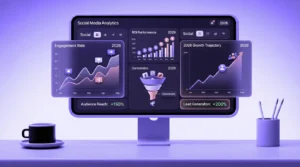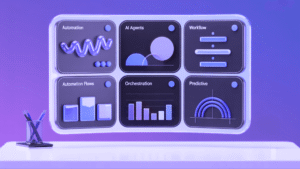An effective PR campaign requires careful strategic planning, creative storytelling, and precise execution across multiple channels. While the process can be complex, breaking it down into key strategic phases helps you build a comprehensive program that delivers results. Here’s a detailed look at how to develop and execute your PR strategy.
Campaign setup
1. Campaign goals
What do you want this campaign to achieve? Be specific. Saying, “I want more customers” isn’t enough. Frame your goals with numbers and timelines. For example:
- “Increase website traffic by 30% within three months.”
- “Get 20 media mentions in target publications by launch week.”
Clear goals keep your campaign grounded and measurable.
Audience data
Who are you trying to reach to ensure this campaign succeeds? Getting to know your audience goes beyond just looking at demographics:
- What are their interests and pain points?
- Which platforms do they use the most?
- How do they consume information?
Understanding your audience allows you to tailor your messaging and meet them where they are. The better you know them, the more your campaign will resonate.
Flexible strategy
Once your goals and audience are locked in, map out the key steps to get there. But here’s the catch: flexibility is key. News cycles change, trends shift, and unexpected challenges happen.
Here’s a tip: Outline your main plan, but also have some backup moves ready to go. Trends change, the news cycle is wild, and things don’t always go as expected – so be prepared to pivot when needed.
Timeline and launch phases
PR campaigns involve a lot of moving parts, so having a detailed schedule helps you stay on track and know if you’re ahead or lagging behind. Break your timeline into three phases:
- Pre-launch: Build buzz with teasers, media pitches, and influencer partnerships.
- Launch: Hit the ground running with press releases, social content, and media coverage.
- Post-launch: Keep the momentum going with follow-ups, audience engagement, and campaign highlights.
Use calendars and project management tools to track deadlines, media drops, and major announcements.
Budget plan
Create a budget plan that allows you to allocate your funds effectively for the best results.
- Media placements
- Events
- Influencer fees
- Tools and technology
Tip: Always include a buffer for unexpected costs—because surprises happen.
2. Message and content development
Key messages
Now it’s time to get your creative juices flowing. Your key messages are the heartbeat of your campaign. Focus on:
- Addressing your audience’s pain points
- Aligning with your campaign goals
- Don’t hesitate to add a touch of personality—being authentic can make your brand feel more relatable.
Make sure these messages are consistent across all platforms and materials.
Amplify with partner influencers
Team up with influential voices in your niche to amplify your key messages. Look for those who align with your brand values and genuinely connect with your target audience.
User-generated content
Authenticity is powerful, and it’s at the heart of successful PR campaigns. Who better to share the essence of your campaign than your audience? Encouraging them to share their experiences can enhance your campaign with user-generated content (UGC).
3. Pre-launch preparation
Monitoring tools
Measure what matters before, during, and after your campaign. Media monitoring allows you to track mentions, sentiment, and reach across various platforms, including print, broadcast, online, and social media.
Tools like Media Meter help you set up alerts for keywords related to your brand or campaign, keeping you informed in real time. This way, you can promptly address any issues and make the necessary adjustments to your campaign.
Crisis communication plan
It’s not about expecting trouble, but crises can happen unexpectedly, and being unprepared can leave you in a difficult position. Create a crisis communication plan that outlines how you’ll respond to potential issues. With a solid strategy in place, you’ll be ready to act quickly when the situation requires it.
Measurement metrics
Decide on the metrics that will help you measure success. Resist the urge to measure everything; instead, keep your goals in mind and choose the metrics that will show whether you’ve achieved them. Focus on the data that ties back to your goals:
- Media mentions: Where did your campaign get covered?
- Engagement: Did people interact with your content?
- Sentiment: Was the coverage positive, neutral, or negative?
- Website traffic: Did your campaign drive conversions or inquiries?
Choose a handful of meaningful KPIs that reflect your campaign’s real impact.
4. Campaign evaluation
Post-campaign report
After the campaign, a detailed report on performance, key insights, and important outcomes will give you a clear overview of your results. Be sure to include both the highlights and lowlights of the campaign, along with feedback from media and audience engagement. This will be valuable during your team debrief and will help inform your next campaign.
Team debrief
Gather your team for an honest review. What worked, and why? What didn’t, and how can you improve next time? Use these insights to refine your approach and level up your future campaigns.
Make an exceptional PR campaign
Running a PR campaign may seem like a juggling act, but a thoughtful checklist can make the process smoother and more effective. Each step— from setting goals to reviewing results—gets you closer to real, measurable impact.Need sharper insights for your next campaign? Let’s talk about how Media Meter can help your team make data-driven decisions. Contact us today to learn more and check out our sample reports.
-
Richelle is a writer, researcher, and a content marketing specialist at Media Meter Inc., turning complex media data into compelling narratives. With a background in research and data analytics, she combines attention to detail with a strategic approach to create content that resonates and drives results, helping brands forge meaningful connections with their audiences.
View all posts




